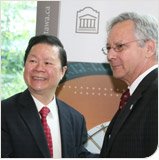
In a classic case of a hierarchical institution’s suppression of an employee’s rights and freedoms, the University of Ottawa continues a campaign against Professor Denis Rancourt based on bogus disciplinary investigations and unfounded disciplinary charges.
To date this has included a dozen or so charges that have all been overturned, dropped, or grieved. Grievances typically take two years to be judged. Several of the early charges and their outcomes were reported HERE and HERE. The first grievance arbitration hearings were reported HERE. Some of the ancillary pettiness is described HERE.
.
It is therefore important to report the cases as they are concluded. The present report gives the final outcome concerning a dean’s 2005 in-class intervention that was at least partly motivated by Israel-Lobby sentiment: LINK.
In September 2005, at the second class of term, Dr. Christian Detellier, dean of the Faculty of Science, University of Ottawa, barged into physics professor Denis Rancourt’s Physics and the Environment course to cancel the class and supposedly to save the students from a perceived threat of great harm from being exposed to activism and to a democratic pedagogical method.
There was strong student protest against the dean’s action (SEE LETTERS), which lead to the class immediately being reinstated, as reported in the media: HERE and HERE.
Rancourt formally grieved the dean’s in-class intervention on October 12, 2005, thereby requesting an apology addressed to him and to all the students who were subjected to the disruption and an assurance that the university would take steps to avoid such outbursts by its executives in the future.
The grievance was followed by several contrived disciplinary attacks against Rancourt which were later dropped by the university despite Rancourt’s requests that they be pursued in order to clarify their merit.
The university fought the grievance for two years but then offered a settlement at the last hour, just before the hearings for another grievance case with Rancourt were about to commence. Had the university not settled, the dean’s in-class intervention would have been part of the investigation that was about to start on November 5, 2007. Consequently, the circumstances, impact, and nature of the dean’s in-class tantrum would have been more fully investigated and judged and could have had more significant bearing on the second case.
The university first tried to propose a secret settlement with a non-disclosure clause but this was flatly rejected by Rancourt’s union (the APUO) after Rancourt intervened. The dean’s in-class intervention had been a public display and the apology needed to be public.
A more suitable settlement text was negotiated between the university and the union. Rancourt rejected this text because it was not a strongly enough worded apology; it was not directed to the students, who suffered most of the consequences of the dean’s actions; and it did not present sufficient guarantees that this could not reoccur.
Despite Rancourt’s objections, the APUO ratified the settlement and justified their position to Rancourt as follows (in a letter from APUO’s president Atef Fahim):
“the Executive [of the APUO] felt that the employer’s statement reflects a commitment about interventions in the classroom that is beneficial to members generally, and does not imply that Prof. Rancourt’s specific situation justified intervention. It felt that the employer’s acknowledgement strengthens academic freedom. Clearly the employer is acknowledging that the classroom intervention was wrong. The employer’s statement is an admission of wrongdoing and a statement of regret over what they have done, and should be considered an apology.”
It appears we must conclude that the settlement is as close to justice as it is possible to achieve in the university context in practice. It also appears that deans don’t apologise to students.
It is interesting to contrast this settlement with the dean’s initial comments to the media that he “followed proper procedure” and that “a few, I can’t name you a number, but a few” students had complained about the course. The recent arbitration hearings established that there had only ever been a single student complaint and that the dean’s action was not based on this student complaint. Did the dean lie?
***
Back in 2005, at the third class of term, when the course (which was popularly known as the activism course) was reinstated and allowed to proceed as planned by Rancourt, a student asked dean Detellier if he had learned anything from the events which his actions had precipitated. Detellier replied that it was too soon to tell and that he would answer this question later. The dean never did answer the student’s question. Maybe now it would be possible to formulate an answer?
.
[Photo: Detail of a 20-metre wall poster made by the students of the 2005 course at an end-of-the-year party.]




No comments:
Post a Comment